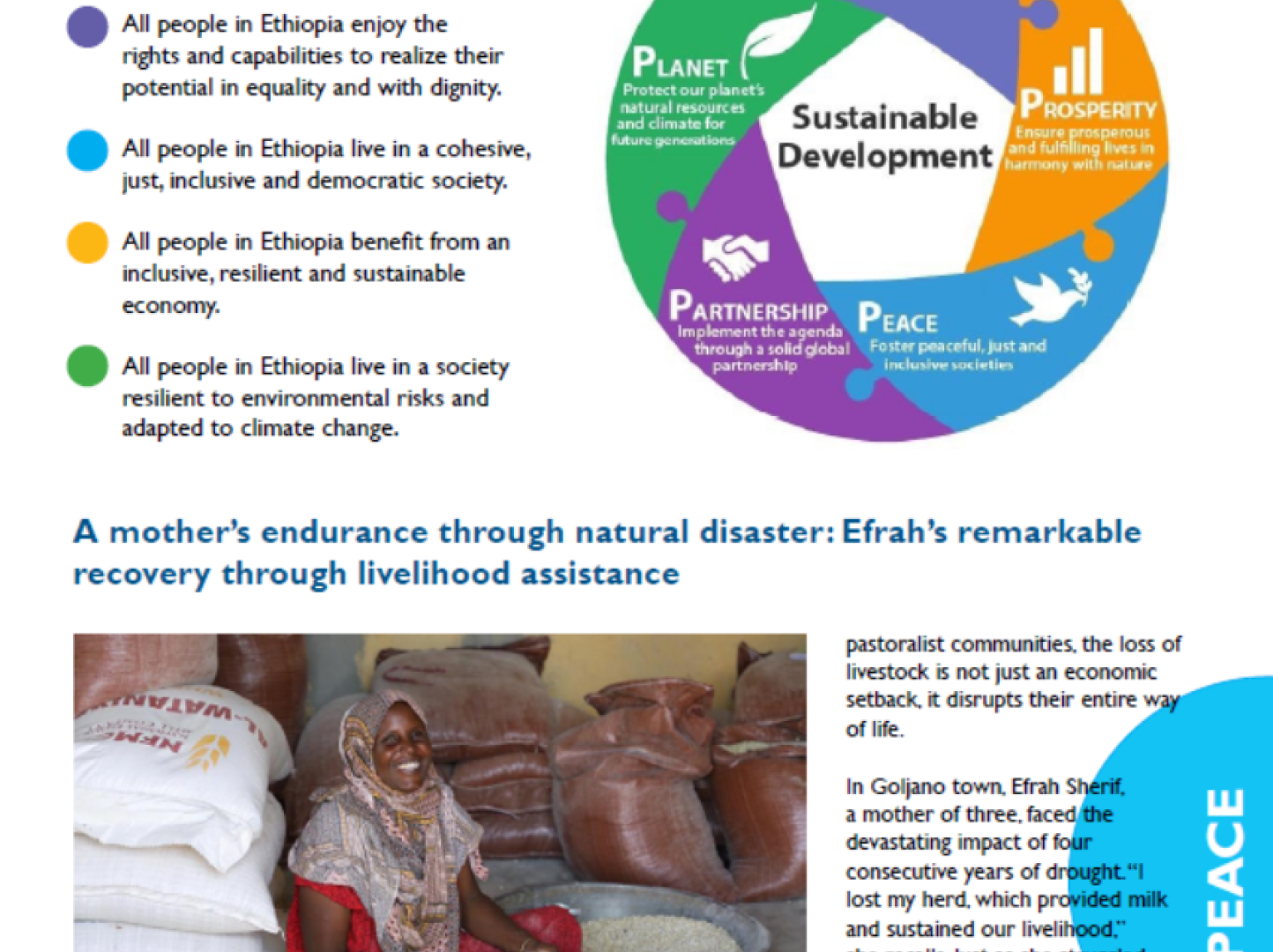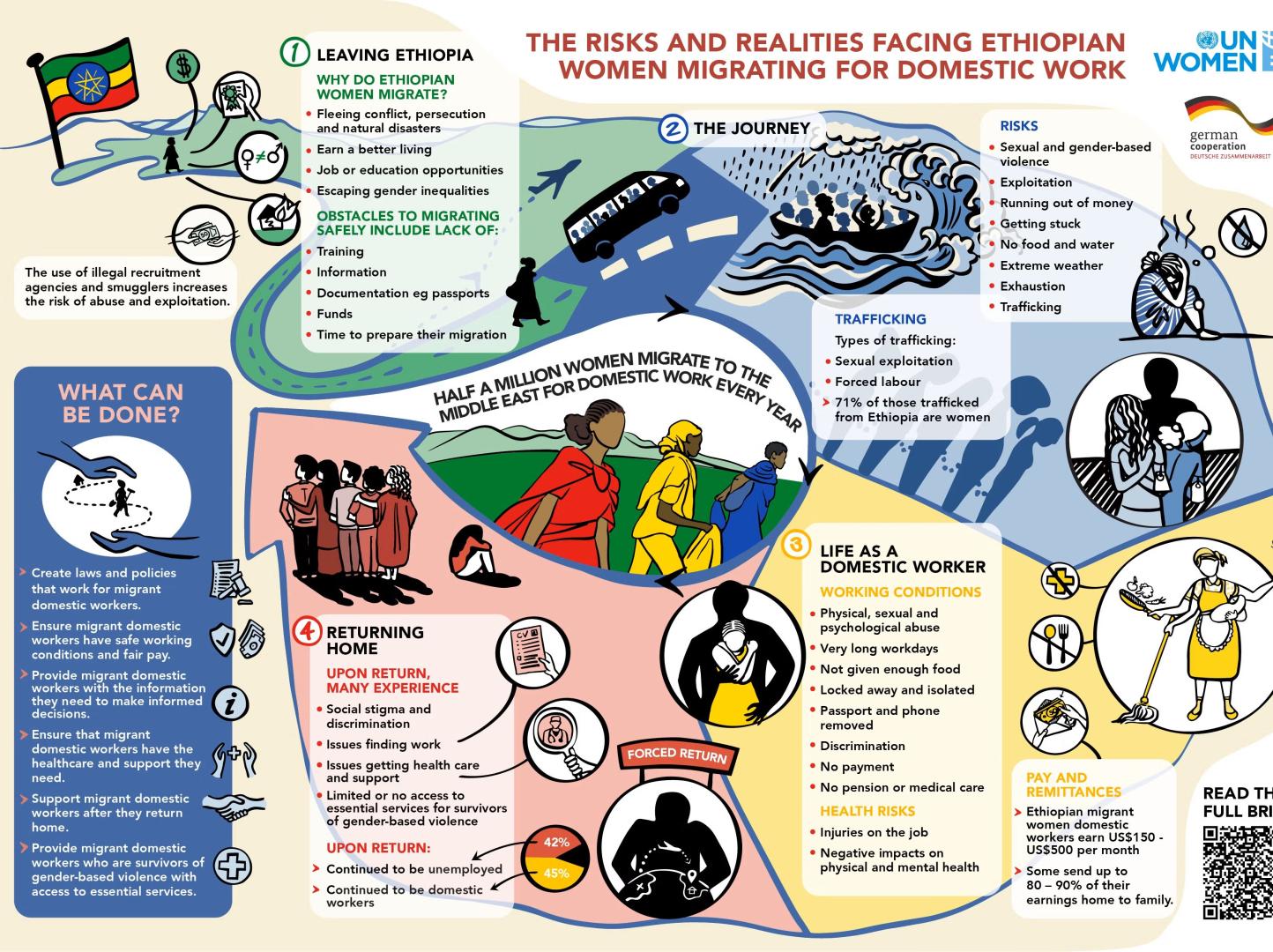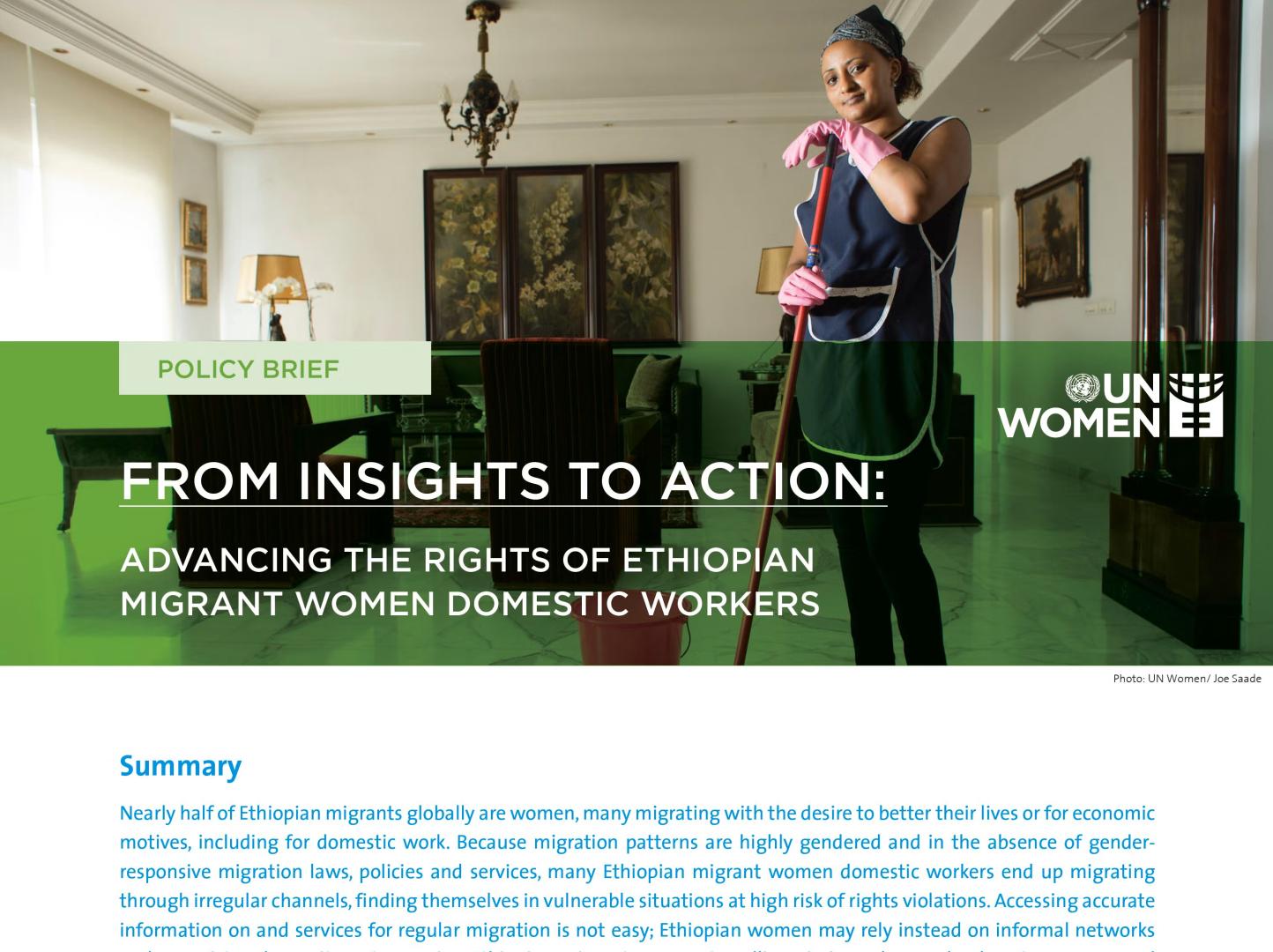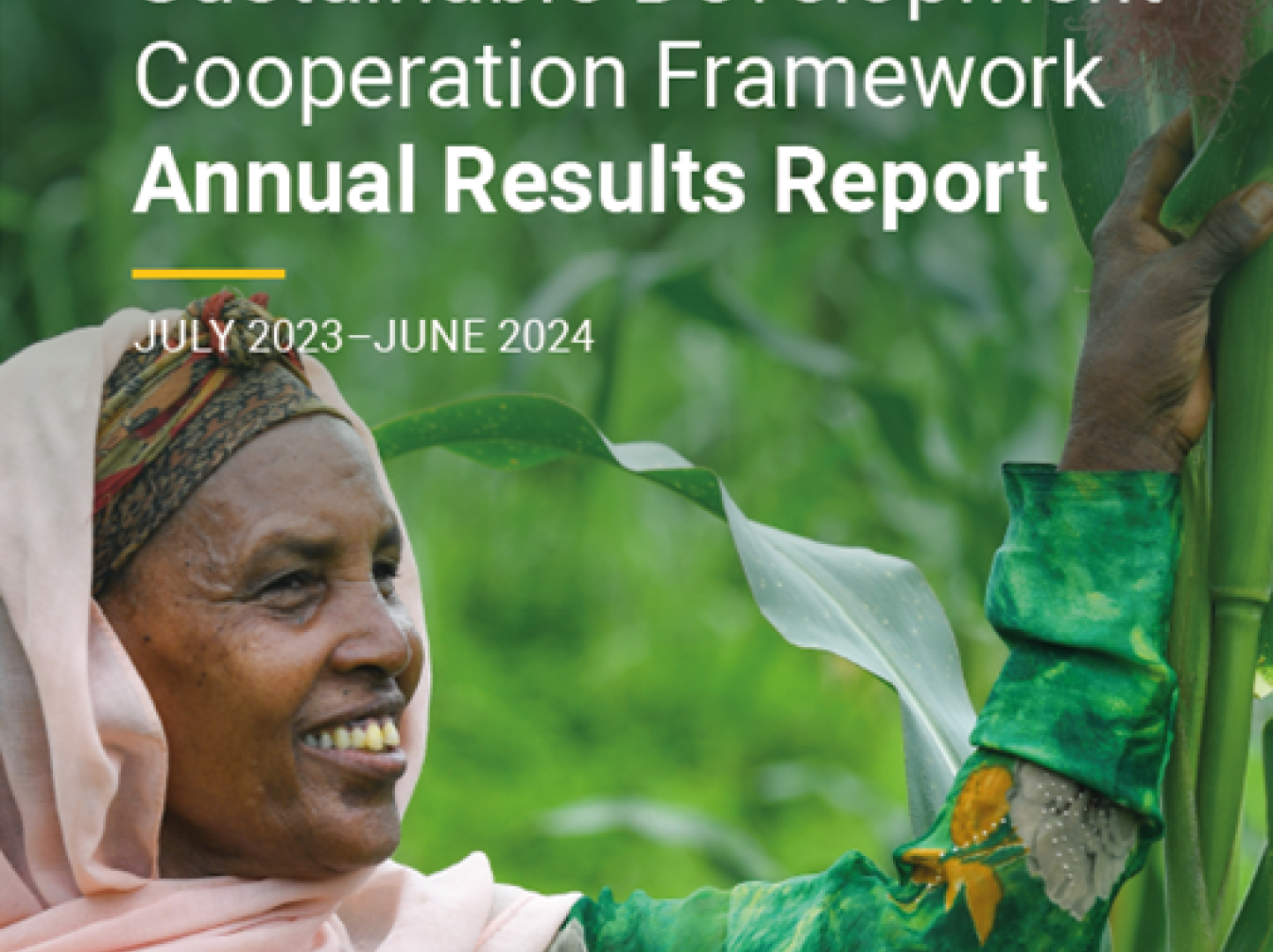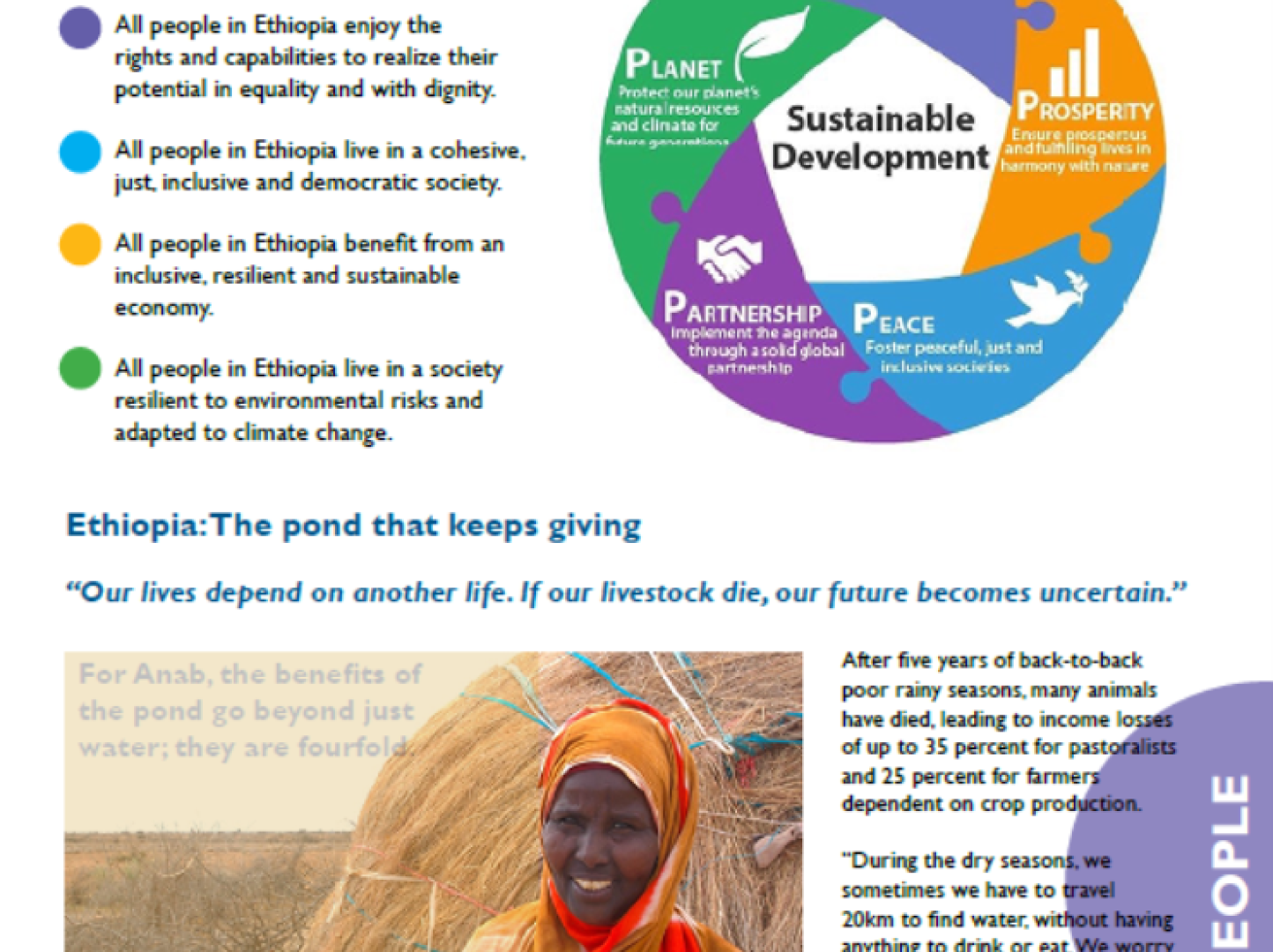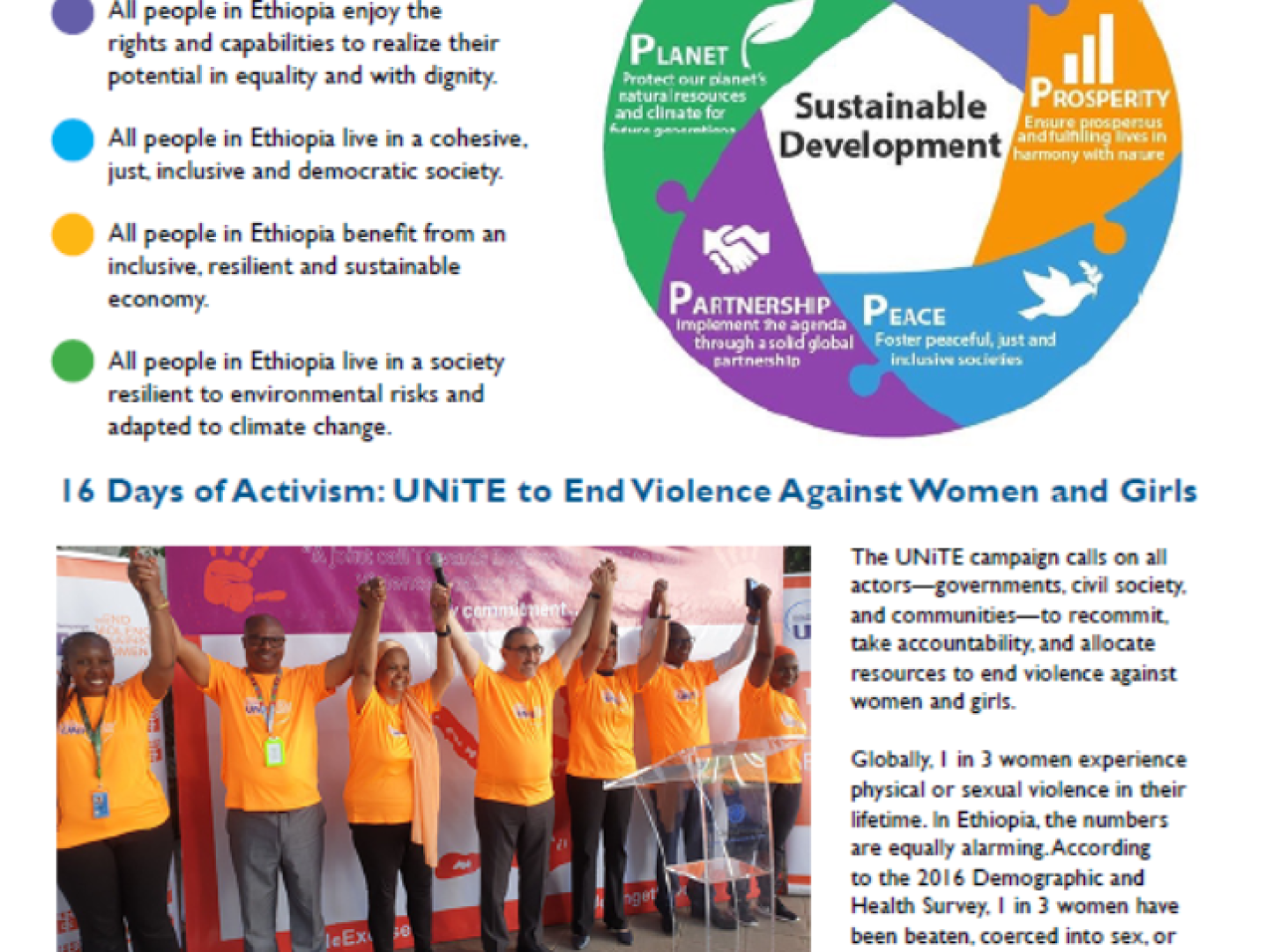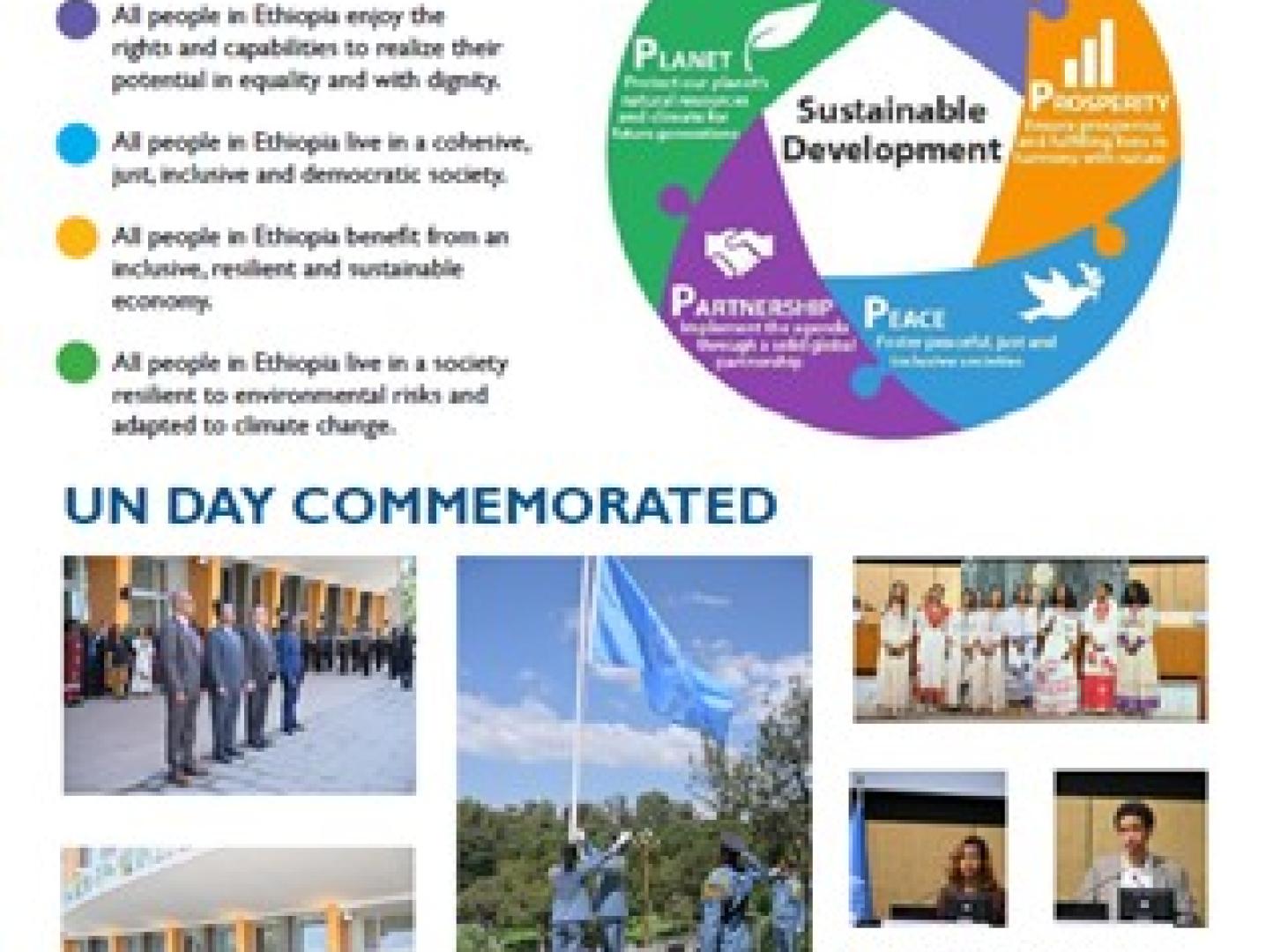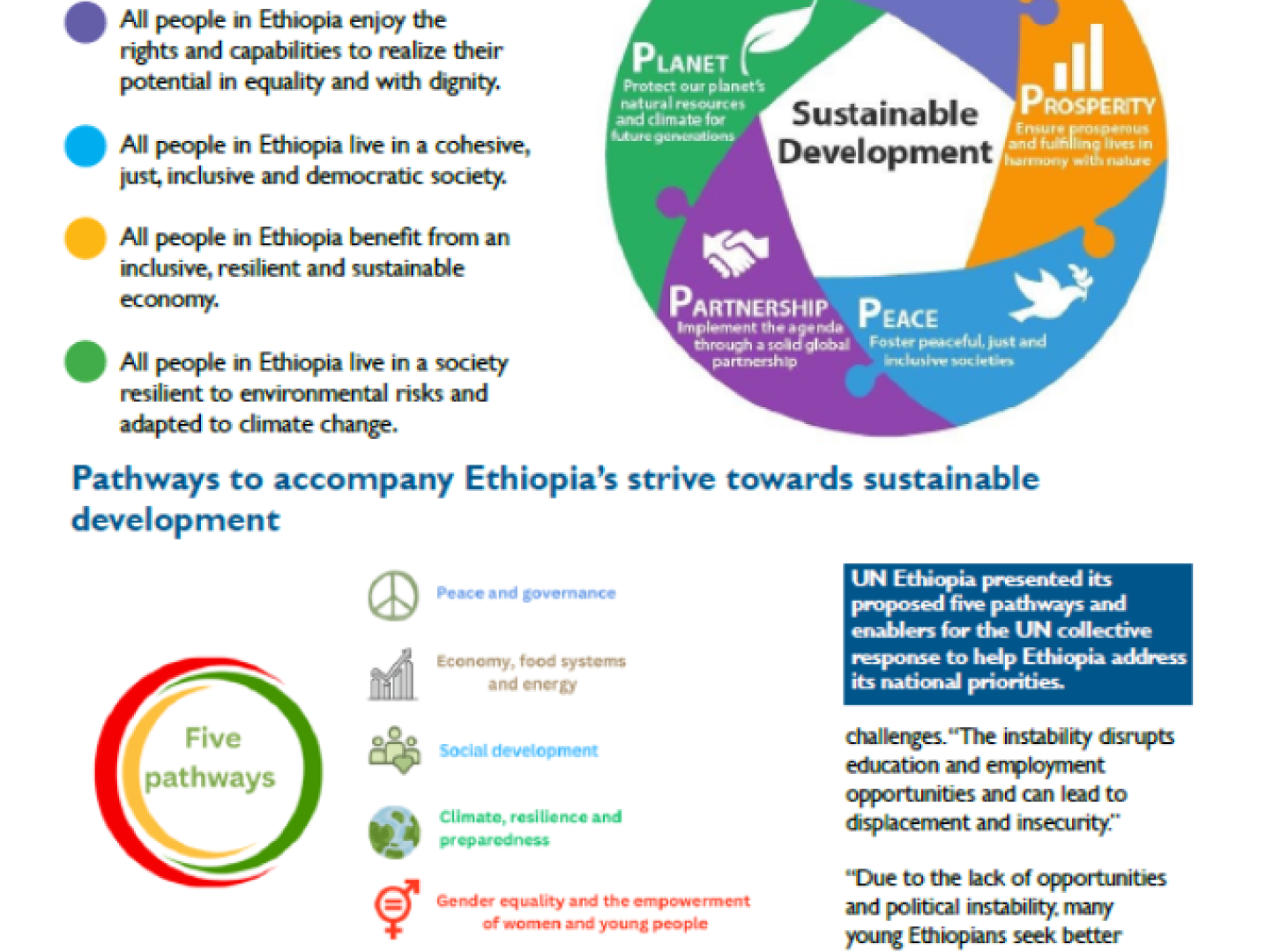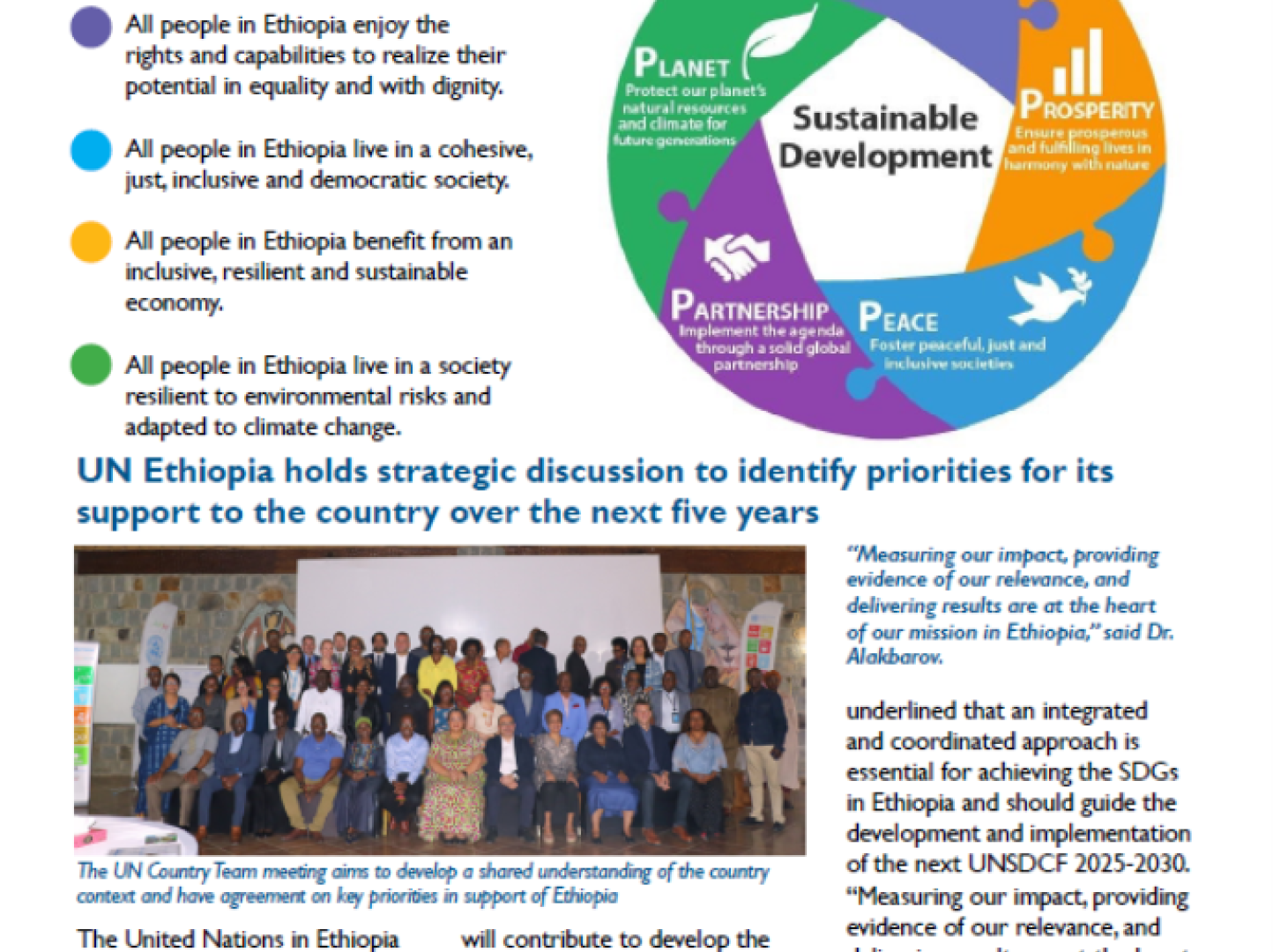Latest
Story
31 July 2025
The Bell of Hope Ushering a New Chapter for Sudanese Children in Ethiopia
Learn more
Story
31 July 2025
On the path to recovery: WFP’s Voucher for Treatment programme Empowers Mothers and children to Combat Malnutrition
Learn more
Story
31 July 2025
From Firewood to the Future: Ethiopia’s Clean Cooking Roadmap Charts a Bold Path to 2035
Learn more
Latest
The Sustainable Development Goals in Ethiopia
The Sustainable Development Goals are a call for action by all countries – poor, rich and middle-income – to promote prosperity while protecting the planet. They recognize that ending poverty must go hand-in-hand with strategies that build economic growth and address a range of social needs including education, health, social protection, and job opportunities, while tackling climate change and environmental protection.
These are the goals the UN is working on in Ethiopia:
Story
31 July 2025
The Bell of Hope Ushering a New Chapter for Sudanese Children in Ethiopia
Metema, Ethiopia – As the midday bell rings at Metema Yohannes Primary School, laughter erupts across the schoolyard. Children spill from their classrooms, racing to their lunch bags, kicking around a makeshift football, and darting toward the toilets – precious minutes of joy and movement.For these children, many of whom fled the conflict in Sudan, this bell signals more than a break from lessons – it marks a fragile sense of safety after months of uncertainty.Located in Metema, a quiet border town in western Ethiopia, the school has become a haven for Sudanese and Ethiopian children escaping violence that erupted in April 2023. The sudden influx of refugees has put enormous pressure on this once-overlooked community.“Even before the crisis, we were stretched thin,” says Mekonnen Kassa, Deputy Principal of Metema Yohannes Primary School. “But when the number of students grew overnight, it became a real struggle, especially when it came to sanitation.”One latrine for every 265 students. That was the reality.For Kalkidan, 14, the school offered hope – but even that came with challenges. “We only have 15 minutes for break. The toilet line was always long. By the time I got back to class, I was sometimes late. Once, the teacher thought I was skipping,” she says, eyes downcast.Her classmate Dagim, 13, adds, “It wasn’t just about the wait. It was about feeling embarrassed. There weren’t enough toilets. And when you're worried about that, it’s hard to think about schoolwork.”The consequences go beyond inconvenience. Inadequate sanitation leads to illness, missed school days, and emotional stress – especially for adolescent girls. The lack of clean, safe toilets silently threatens children's health, dignity, and future.Recognizing the urgency, the International Organization for Migration (IOM) stepped in. After assessing the Water, Sanitation and Hygiene (WASH) needs at the school, IOM constructed two semi-permanent latrine blocks, each with 12 stalls – divided for boys and girls, and equipped with inclusive features for students with disabilities.“These facilities aren't just structures, they restore dignity,” says Alehegn Ayele, IOM WASH Assistant. “When students have access to clean, safe toilets, they show up differently. They focus, they participate, they thrive.”The change was immediate and visible. “Now the student-to-toilet ratio is one for every 105 students,” says Deputy Principal Mekonnen. “That’s a huge improvement. We’ve seen fewer absences and a real lift in morale.”For Kalkidan, the difference is deeply felt. “Now, I don’t have to rush or worry about being late. I can just focus on learning.”From 2023 to today, IOM has constructed or rehabilitated over 5,300 latrines across Ethiopia –benefiting more than 100,000 refugees, displaced persons, returnees, and host community members. But in places like Metema, the impact is measured not only in numbers, but in the smiles of students reclaiming their right to learn.Because when a child feels safe enough to learn, they don’t just survive – they begin to dream again. And with every latrine built, every hand washed, and every bell rung, hope echoes a little louder across the border.
1 of 5
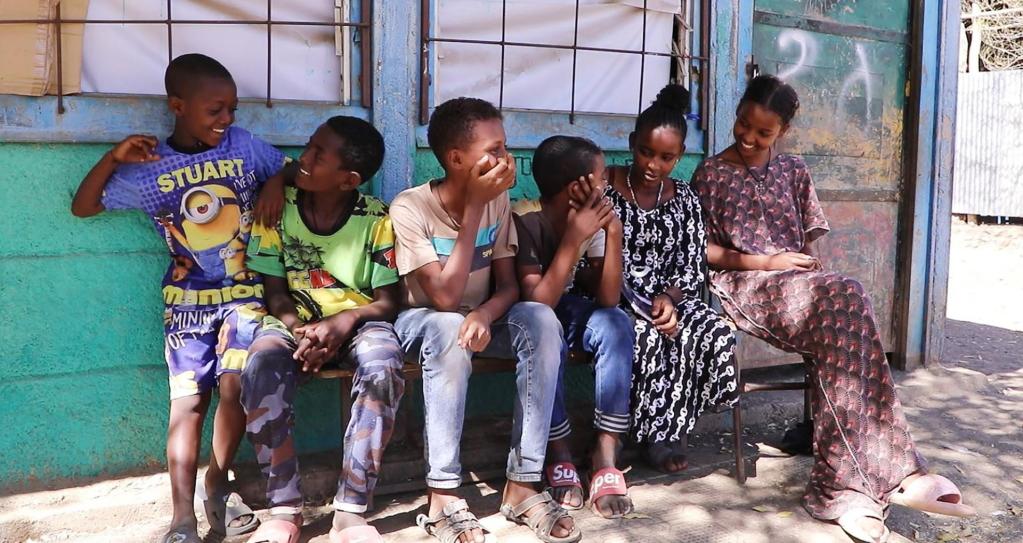
Story
31 July 2025
On the path to recovery: WFP’s Voucher for Treatment programme Empowers Mothers and children to Combat Malnutrition
Hawa Mohammed cradles her 10-month-old baby and listens intently to a nutritious food preparation demonstration in Guguftu village in South Wollo zone of the Amhara region. Hawa’s daughter, Hassinet, is malnourished and has been enrolled into WFP’s Voucher for Treatment programme, after Hawa brought her to the Guguftu Health Post. This demonstration is an integral part of WFP’s Voucher for Treatment programme, which complements the provision of an electronic voucher that allows participants of the programme to purchase recommended fresh foods that will help set them on the path to recovery from malnutrition. This alternative approach for the use of local foods to address moderate wasting is especially important because it also boosts the local economy and increases the availability of these foods in rural markets. Mothers like Hawa are encouraged to cook and consume these fresh nutritious foods, through culturally sensitive behavior change strategies. “My husband is a farmer,” says Hawa; he is the bread winner of our family. We have a small plot of land from where we grow some crops but could only bring a meagre income. We can hardly afford to buy the varieties of food items to provide for ourselves, let alone something similar to what has been demonstrated.” As part of this Voucher for Treatment programme, Hawa is provided with the electronic voucher so she can buy recommended nutritious food items from local traders. The programme holds screening at the community level, where health workers assess individuals—especially children and pregnant or breastfeeding women—for signs of malnutrition or health concerns. The women and children have routine follow-ups at the health post every two weeks, where their progress is monitored, and additional support is given as needed. Health workers also conduct home visits, offering community support and reinforcing health and nutrition education. Once the nutrition demonstration ends, Hawa and the other mothers head to the market to purchase special food items from retail sellers to prepare nutritious meals for their children at their homes. At the markets, they have access to different food items from the food groups such as cereals, legumes/pulses, animal proteins and fruits, and vegetables, iodized salt, and vegetable oil. The quantities of each food item are determined for the moderately malnourished children and mothers respectively, to meet a minimum nutrient profile deemed to be sufficient to ensure nutritional recovery.“Look how happy my child is, she’s so healthy and always cheerful,” says Hawa pointing at her daughter. “It is surprising even for myself that she’s never been sick since I began feeding her the recommended food items which I get for free through the voucher system. I am so grateful for this opportunity,” she said with a smile. With thanks to funding from the UK, the programme is being implemented in 42 districts of Amhara, Oromia, Central, Sidama, and Southern Ethiopia regions reaching 120,000 malnourished children aged 6 to 59 months as well as pregnant and breastfeeding mothers.Hawa is now well enlightened about nutrition and is determined to support her daughter to recover and grow healthy.
1 of 5

Story
31 July 2025
Transforming Livestock Farming – The Liquid Nitrogen Plant Project
Supported by the World Bank through the Lowlands Livelihood Resilience Project and implemented by UNOPS on behalf of the Ministry of Irrigation and Lowlands, a new Liquid Nitrogen Plant is transforming agricultural practices for local farmers.The plant, described as modern, compact, and eco-friendly, produces 32 liters of liquid nitrogen per hour, providing a critical resource for preserving semen used in artificial insemination. According to Endale Shiferaw, UNOPS Project Manager, the facility is a game-changer, ensuring high-quality genetic material for livestock breeding while reducing costs and logistical challenges.Previously, farmers and technicians had to travel over 680 kilometers to access liquid nitrogen, leading to high expenses and storage risks. Alem Work, the Nitrogen Plant Coordinator, emphasized that the new plant now serves eight woredas, significantly cutting transportation costs and improving breeding success rates. To further extend its reach, the project also distributed a truck and ten motorcycles, enabling veterinary services to reach remote communities.Moges Fiseha, an Artificial Insemination Expert, noted that more farmers are adopting artificial insemination as a safe, efficient, and cost-effective method to enhance livestock production. The technology provides access to superior genetics, increasing milk and meat yields while reducing risks associated with natural mating, such as injuries and disease transmission.For local farmers like Bezunesh Bisetegn, the benefits are clear. The ability to select female calves for dairy farming has boosted productivity and profitability. Abera Mekonnen, Agro-Industry Livestock Sector Coordinator, highlighted how the project has empowered farmers with better breeding control, leading to healthier, more productive livestock.By improving genetics and supporting sustainable farming practices, this initiative is paving the way for a more resilient future for Ethiopia’s lowland communities, ensuring long-term food security and economic growth.
1 of 5

Story
31 July 2025
From Firewood to the Future: Ethiopia’s Clean Cooking Roadmap Charts a Bold Path to 2035
As of 2024, less than 10%* of Ethiopia’s population has access to clean cooking solutions—far below the global average. This gap has serious and far-reaching consequences. Most households still rely on traditional cooking fuels such as firewood, charcoal, and animal dung, which pose significant health, gender, environmental, and economic challenges.Indoor air pollution from these fuels causes premature deaths, particularly among women and children. Women also spend many hours collecting firewood, exposing them to health risks and gender-based violence. Environmentally, this practice contributes to deforestation, CO₂ emissions, and soil degradation. Economically, the cost of inaction outweighs the cost of intervention.To address this, Ethiopia has launched a Clean Cooking Roadmap to increase access to clean cooking solutions to 75% by 2035. This ambitious but achievable target aims to save lives, protect the environment, and support national development.Despite previous efforts, Ethiopia’s clean cooking sector has struggled due to fragmented initiatives, limited financing, and the absence of a national framework. While various strategies and projects exist, they lack coordination and a unified direction. Historically, cookstove initiatives have received only a fraction of the investmentallocated to electricity infrastructure. Without a comprehensive, costed, and time-bound plan, scaling clean cooking solutions has remained slow and unsustainable.The Solution: A National RoadmapThe newly launched National Clean Cooking Roadmap (2026–2035) is designed to address these systemic challenges. It is evidence-based and costed, built on data, modelling, and community assessments to ensure that interventions are tailored to local needs, cooking habits, and realities.With clear milestones and targets, the roadmap charts a path toward achieving 75% access by 2035. It aligns with Sustainable Development Goal 7 (SDG 7), Ethiopia’s climate commitments, and the 10-year development plan. It also integrates clean cooking with electrification, gender inclusion, and climate finance.According to the Investment Plan of the National Clean Cooking Roadmap, Ethiopia will require $3.38 billion through 2035 to meet its targets. Funding will come from a mix of grants, carbon credits, concessional loans, government contributions, and private sector investment.Who Is InvolvedGovernment leadership is central to the roadmap’s success, with the Ministry of Water and Energy (MoWE) leading the process. The roadmap brings together private sector actors and entrepreneurs, encouraging them to innovate and scale clean cooking technologies. These efforts are supported through business development assistance and access to finance.Development partners are also playing a key role by providing technical and financial support, including results-based financing and grants. A newly established National Clean Cooking Coordination Unit will harmonize efforts across government ministries, NGOs, civil society, development partners, academia, and the private sector.UNDP’s RoleAlthough the roadmap is government-led, the United Nations Development Programme (UNDP) plays a catalytic role.UNDP provides technical and analytical support, including value chain analysis, modeling, and target-setting to ensure that interventions are both effective and scalable.UNDP also helps convene stakeholders by supporting platforms for collaboration among government, civil society, and the private sector. This strengthens coordination and alignment. Importantly, UNDP’s involvement reinforces government ownership and builds national capacity for long-term sustainability.The Vision AheadWith the right actions and investments, the roadmap can significantly expand access to clean cooking. This will:Reduce the burden on womenImprove public healthCreate economic opportunitiesLower emissionsProtect forestsEnhance climate resilienceNow is the time for government, communities, and partners to come together and turn this vision into reality. The roadmap provides a clear direction—but achieving its goals will require collective commitment and sustained effort.
1 of 5

Story
31 July 2025
A Journey of Paving the Path to Safe Motherhood
The center provides care to nearly 80,000 people including communities from neighbouring areas in the Southwest Region. But for many women, access to healthcare remains a distant dream due to poor road infrastructure, lack of transportation, and long-standing cultural barriers.Abeba is more than just a midwife. She’s a trusted confidante, a mentor, and a compassionate presence in the lives of the women she serves. Young girls turn to her first for advice on sexual and reproductive health. Pregnant women light up when she visits their villages, eager to share their fears and dreams under her reassuring care.“They see me as their sister,” Abeba says with a warm smile. “When they speak, I listen. When they are afraid, I reassure them. And when they deliver safely, we celebrate together.”Each month, around 60 women give birth at Metti Health Center, many traveling long distances from remote villages where traditional practices still prevail. Abeba knows that gaining their trust is just as crucial as providing skilled medical care.Thanks to UNFPA support, Abeba now conducts outreach using a mobile ultrasound machine, bringing antenatal care directly to women in remote health posts. She works closely with health extension workers and community leaders to ensure no woman is left behind.“I didn’t have to travel far, she brought the ultrasound to our village,” says Apel Libdos, an expectant mother. “She confirmed that my pregnancy is healthy. Now at six months, I know we are in good hands.”Abeba is not only a caregiver, but she is also a mother. Currently pregnant and raising a three-year-old son, her personal journey deepens her empathy and strengthens her connection with the women she serves. “I understand their fears, their hopes, and the strength it takes to bring life into the world,” she says. Her lived experience fuels her dedication, making every interaction more personal and every life saved even more meaningful. Building Capacity, Strengthening CareAbeba’s commitment to maternal and reproductive health extends beyond childbirth. She provides family planning, postnatal care, and continuous support to women, understanding that comprehensive care is essential for their health and empowerment.Capacity-building trainings supported by UNFPA have further strengthened her skills and those of her colleagues at Metti Health Center. These trainings have equipped Abeba with the knowledge and tools to deliver higher quality care and respond more effectively to the needs of her community.“She is a deeply committed and empathetic healthcare provider,” says Mr. Tamru, the Medical Director of Metti Health Center.Holding on to HopeDespite the daily challenges, Abeba remains hopeful. With support from UNFPA and other partners, she continues her mission, driven by the dream of a future where every woman has access to quality healthcare, regardless of where she lives.Her story is a powerful testament to the impact of compassion, commitment, and community connection.
1 of 5

Press Release
20 June 2025
Ethiopia and United Nations Sign New Cooperation Framework
The Government of Ethiopia and the United Nations in Ethiopia have officially signed the United Nations Sustainable Development Cooperation Framework (UNSDCF) for the period 2025 to 2030, signaling a renewed partnership aimed at advancing Ethiopia’s development priorities and achieving the Sustainable Development Goals (SDGs).The signing ceremony took place at the Ministry of Finance and was attended by Her Excellency Semereta Sewasew, State Minister of Finance of Ethiopia, and Dr. Ramiz Alakbarov, UN Assistant Secretary-General and UN Resident and Humanitarian Coordinator for Ethiopia. The event was further attended by Heads of UN agencies operating in Ethiopia, emphasizing the strong collaborative effort to support the country’s development agenda.The new Cooperation Framework aims to address Ethiopia’s most urgent challenges through a comprehensive approach that promotes resilience, inclusivity, and sustainable growth by strengthening resilience to climate change and economic shocks, building sustainable food systems and improving livelihoods—particularly in rural areas—creating job opportunities with a focus on empowering youth and women, modernizing development programs through digital transformation, and providing targeted support to vulnerable populations such as women, children, and persons with disabilities.This framework is developed through an inclusive, participatory process aligned with Ethiopia’s Ten-Year Development Plan and the Home-Grown Economic Reform Agenda 2.0. It also reflects Ethiopia’s commitment to the global 2030 Agenda for Sustainable Development, emphasizing self-reliance, peace, and stability. The UNSDCF is organized around five strategic pillars—Peace and Good Governance; Economic Development, Food Security, and Energy; Social Services, Education, and Protection; Environmental Sustainability, Climate Resilience, and Disaster Preparedness; and Gender Equality and Youth Empowerment—that will guide interventions over the next five years, with the aim of complementing and strengthening Ethiopia’s ongoing efforts toward sustainable and inclusive development.An estimated US$6.5 billion is required to implement the framework fully over five years. Currently, approximately US$1.5 billion has been mobilized, leaving a funding gap of US$5 billion. Addressing this gap will be critical for realizing the framework’s objectives and ensuring impactful results.Ethiopia hosts one of the largest United Nations Country Teams (UNCT) globally, comprising about 28 UN agencies based in Addis Ababa. To enhance coordination and maximize impact, the framework introduces strengthened mechanisms, including empowered Results Groups responsible for integrated planning, monitoring, and reporting. These measures are designed to improve coherence and efficiency across UN interventions.“The new Cooperation Framework embodies our shared vision and trust in Ethiopia’s reform journey,” said Her Excellency Semereta Sewasew. “It sets a strong foundation for transformative progress, and I urge all UN agencies to fully implement the coordination mechanisms outlined, as this is essential for maximizing our collective impact.”Dr. Ramiz Alakbarov emphasized, “This Framework reflects the strength of our partnership with Ethiopia. Through joint efforts, we aim to build resilient systems, empower women and youth, and develop sustainable solutions so that no one is left behind. The UN is committed to leveraging its expertise and partnerships to support Ethiopia’s development priorities and accelerate progress toward the SDGs.”The UNSDCF is scheduled to commence in July 2025, with the Government of Ethiopia reaffirming its commitment to its effective implementation. The partnership aims to deliver measurable progress in Ethiopia’s journey toward a peaceful, prosperous, and resilient nation.
1 of 5
Press Release
10 April 2025
UNOPS Executive Director to visit Ethiopia, Somalia and Sudan
Jorge Moreira da Silva, UN Under-Secretary-General and UNOPS Executive Director, is scheduled to visit the Africa region, in a five-day visit that will take him to Ethiopia, Somalia and Sudan. During his visit, Mr. Moreira da Silva will meet national authorities and development partners. He will discuss the practical solutions that UNOPS offer to partners to maximize the impact of their humanitarian, development and peace operations ―all in support of the Sustainable Development Goals.The visit also aims at getting a better understanding of the needs on the ground, and how UNOPS can scale operations to respond.UNOPS ongoing support in the region includes: In Sudan, where half of the population ―some 25 million people― need humanitarian assistance and protection, UNOPS is strengthening health infrastructure, improving access to clean, safe water, supporting peacekeeping operations to protect civilians, and facilitating a more sustainable and equitable use of natural resources. In Somalia, UNOPS works to strengthen the capacity of Somali institutions and supports partners in a range of sectors, such as health, governance, peace and security. We work to support reconstruction and state-building through disaster preparedness planning, crisis recovery, climate-resilient infrastructure and strengthening of the security sector.In Ethiopia, UNOPS works with partners to support national and international development priorities. Over the years, with our partners, we have helped strengthen health and education systems and supported food security. This includes environmentally friendly solutions and innovative models to modernize Ethiopia’s agriculture sector, provide clean energy to off-grid areas and improve health services across the country.ENDSPress contact details:For media requests, please contact Taraneh Dadar <taranehd@unops.org> or Luis Piselli <luispi@unops.org>About UNOPSUNOPS offers practical solutions across peace and security, humanitarian and development operations. We help the United Nations, governments and other partners, such as the European Union and its Member States, to manage projects, and deliver sustainable infrastructure and procurement across the world. Read more: www.unops.org.
1 of 5
Press Release
09 April 2025
Restoring Hope: Health and Education Facilities Rebuilt in Asgede Woreda, Tigray
Tigray, Ethiopia, April 2025 – In a significant step towards rebuilding essential public services in conflict-affected areas, the Edaga Hibret Health Centre and May Hanse Primary School in Asgede Woreda, Tigray, have been successfully rehabilitated and officially handed over on April 8 and 9, 2025 respectively. These projects were part of the Response-Recovery-Resilience for Conflict-Affected Communities in Ethiopia (3R4CACE) Project, financed by the World Bank and implemented by UNOPS, demonstrating a commitment to restoring critical health and education services for the community.The conflict had left both the health centre and the school severely damaged, disrupting access to healthcare and education for thousands. Through these reconstruction efforts, the Government of Ethiopia and its partners have worked to rebuild resilient infrastructure that now serves the needs of the local population. Healthcare at Edaga Hibret Health Centre - The Edaga Hibret Health Centre, which had previously suffered extensive damage—including the destruction of the outpatient department (OPD), pharmacy, and chemical storage areas has been rehabilitated to once again provide essential healthcare services. The newly improved facility now includes:A new pharmacy block to enhance medical supply storage and distributionA hybrid toilet building with a septic tank and soak-away pit for better sanitationA water supply system to improve hygiene standardsAn electrical system to ensure uninterrupted operationsExternal works, such as fencing, gates, walkways, and water points, creating a secure and accessible environmentWith these improvements, the health centre is now able to serve 20,000 patients, ensuring better access to quality healthcare, particularly for disabled individuals and vulnerable populations.Education at May Hanse Primary School - Similarly, May Hanse Primary School has been reconstructed to provide a safe and conducive learning environment for students who had previously been left without a functioning school. The recovery efforts included:Two new classroom blocks with six classrooms, each accommodating at least 50 studentsA hybrid toilet building with modern sanitation facilitiesA water supply system to support hygiene and daily school operationsAn electrical system for improved learning conditionsExternal works, including fencing, gates, walkways, and landscaping to enhance accessibility and securityAs a result, the school now accommodates 1,978 students, many of whom had no access to education due to the conflict. The school has targeted to employ 46 teachers, ensuring that students receive quality instruction. Additionally, blackboards have been procured, and desks are set to be delivered to fully equip the classrooms.The successful rehabilitation of the Edaga Hibret Health Centre and May Hanse Primary School stands as a testament to the dedication of the Ethiopian government, the World Bank, and UNOPS to restoring essential services and fostering resilience in conflict-affected regions.
1 of 5
Press Release
06 March 2025
UNOPS supports healthcare delivery in Ethiopia with handover of vital equipment for distribution of supplies
UNOPS is pleased to announce the successful handover of a range of vital equipment to the Ethiopian Pharmaceutical Supply Service (EPSS). This procurement, conducted on behalf of EPSS, represents a significant step forward in its mission to strengthen the distribution of healthcare supplies to health facilities nationwide. The delivered items include 2 refrigerator trucks, 16 land cruiser vehicles, 10 euro cargo trucks with refrigerated cargo boxes, 10 mini-vans Euro cargo, 4 mini-vans Trakker with cargo boxes, 19 motorcycles, 18 generators, cold chain equipment, spare parts and accessories, a forklift, and a floor cleaning machine. The procured items are equipped with modern safety measures and eco-friendly technology, intended to enhance the operational capabilities of EPSS branches. This will allow EPSS to deliver services to health facilities with improved efficiency and reliability. During the handover ceremony, Ms. Worknesh Mekonnen, Director of the Horn of Africa Multi-Country Office of UNOPS, and Representative of the African Union, said: "We are thrilled to deliver these vehicles, generators, cold chain equipment, and other related materials. This handover represents our commitment to meeting the evolving needs of our partners, and we take great pride in providing the support that enhances their operations”The event was attended by H.E. Dr. Mekdes Daba, Minister of Health; Mr. Dr. Abdulkedir Gelgelo, Director General of Ethiopian Pharmaceutical Supply Service; Ms.Mazengya Lucy, Africa CDC East Africa Regional Director, and other government officials reflecting the strong partnerships and collaboration driving this initiative.UNOPS remains committed to supporting practical solutions for sustainable development and humanitarian efforts, delivering innovative solutions for community well-being, promoting sustainability, and upholding operational excellence.
1 of 5
Press Release
25 February 2025
Germany commits additional 50 million Euro for cross-country humanitarian responses
At a press conference held at the UN Conference Center today, H.E. Jens Hanefeld, Ambassador of the Federal Republic of Germany to the Federal Democratic Republic of Ethiopia and Permanent Observer to the African Union, together with UN Assistant Secretary-General and UN Resident and Humanitarian Coordinator for Ethiopia, Dr. Ramiz Alakbarov, reaffirmed their joint and continued commitment to the people of Ethiopia. The event highlighted Germany’s additional commitment of 50 million EUR in humanitarian assistance, which will support cross-country projects implemented by UNHCR, UNICEF, and UN Women. This funding, officially announced at the end of 2024, will strengthen the humanitarian response also in Ethiopia over the coming years and address critical needs in vulnerable communities.Dr. Alakbarov expressed gratitude for Germany’s unwavering support and its role as a steady and reliable partner to the UN system in Ethiopia. He emphasized Germany’s commitment to the principles of the Grand Bargain, which aim to improve the effectiveness and efficiency of humanitarian action. By providing unearmarked funding, Germany enables UN agencies to respond flexibly and swiftly to emerging humanitarian crises, ensuring that resources are allocated where they are most needed. "The United Nations deeply appreciates the steadfast support of the people and Government of Germany in addressing Ethiopia's humanitarian challenges. Germany’s flexible and vital contributions have enabled lifesaving assistance while fostering resilience among vulnerable communities. This partnership exemplifies the power of global solidarity and our shared commitment to dignity, inclusion, and sustainable solutions for those most in need," said Dr. Alakbarov.In 2024, Germany provided significant financial support to the UN system in Ethiopia, channeling a total of 44 million EUR through several UN agencies. UN OCHA received 14,9 million EUR, prioritizing anticipatory action in drought-affected areas and localization efforts through the Ethiopian Humanitarian Fund (EHF), where Germany remains the largest donor in 2024. UNHCR Ethiopia received 4,1 million EUR as part of a regional initiative to support displaced persons in the East and Horn of Africa and the Great Lakes region. UNICEF Ethiopia was allocated 3,8 million EUR to expand its child protection efforts, especially in response to sexual and gender-based violence. Additionally, UN Women is advancing gender accountability, addressing inequality and gender-based violence in humanitarian crises with German support.Beyond these initiatives, German funding has also extended to the World Food Programme (19,1 million EUR), IOM (1 million EUR) and WHO (750.000 EUR).Building on this strong foundation, Germany’s additional 50 million EUR commitment to cross-country projects will further enhance the humanitarian response. This funding will ensure that lifesaving assistance reaches those most in need while fostering resilience and sustainable development. Together, Germany and the UN system in Ethiopia are working to address urgent humanitarian needs while promoting long-term solutions that protect and empower the most vulnerable communities.For any inquiries you may have, please contact: Ms. Sophia Stephan: Press and Culture Section Head, Embassy of the Federal Republic of Germany: Pr-1@addi.diplo.de Mr. Fanuel Lakew, Press Assistant: Pr-11@addi.diplo.de Mr. Getachew Dibaba, UN Ethiopia, Email: Getachew.Dibaba@un.org Phone: +251-911-125-201Find us: German Embassy Addis Ababa on X / German Embassy Addis Ababa on Facebook UN Ethiopia Website / UN Ethiopia on X / UN in Ethiopia on Facebook
1 of 5
Latest Resources
1 / 11
Resources
29 April 2025
Resources
29 April 2025
1 / 11




















